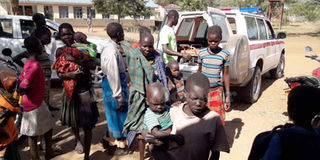Prime
Mobile clinic van saves Amudat mothers, babies

An ambulance delivers an expectant mother and other patients to Lorot Health Centre in Amudat District last week. PHOTO/STEVEN ARIONG
What you need to know:
- Health officials say since the transport facilities were introduced, the district no longer registers maternal deaths.
Her labour pains kicked in but there were no ready means of transport to take her to a nearby health facility.
Betty Chepkuru, 32, a resident of Katabok, Loro Sub-county in Amudat District, braved the pain and start walking to a health centre as her husband searched for means to take her to Kapenguria Hospital in Kenya, 60 kilometres away from their home.
Chepkuru had barely walked three kilometres when the labour pangs intensified.
“I cried out loud, attracting the attention of an old woman. She helped me deliver but unfortunately, the baby died shortly,” told Daily Monitor this week.
The mother of three said she had previously been helped by a traditional birth attendant near their village but she has since died.
Lack of accessible maternal services had been pushing mothers to walk to Kenya until March when government distributed ambulances and mobile clinic vans to four districts, including Amudat, Napak, Nabilatuk, and Moroto .
The Office of the Prime Minister (OPM) through the Dry Land Integrated Development Project, procured the facilities.
“During my time of delivery, it was wheelbarrow that neighbours used to carry me to a health centre. Now, you just call for an ambulance to pick a mother from home to hospital for free,” Ms Magadalen Losia, a resident of Cheptapoyo Village in Amudat, said.
Ms Mercy Chelangat, another resident, said the facilities are a blessing.
“We used to walk many kilometres to health centres but now doctors and nurses move around our villages to conduct antenetal services and treating those with minor illnesses,” she said.
Dr Patrick Sagati, the medical superintendent of Amudat Hospital, said since the transport facilities were introduced, the district no longer registers maternal deaths.
“Incidents of mothers losing lives and their babies because they can’t easily access health facilities is no more because the mobile clinic van moves to villages three days a week,” he said, adding that mothers no longer cross to Kenya .
Mr Francis Okori, the assistant commissioner in-charge of Karamoja Sub-region in the OPM, said four mobile clinic vans were procured to improve maternal health services in the four districts, which were the most vulnerable in health services.
He said the Dry Land Integrated project also constructed 35 health facilities across the sub-region and setting up comprehensive emergency and newborn care facilities in hard to reach areas.
Task ahead
The then Minister for Karamoja Affairs, Mr John Byabagambi, said an assortment of maternal and newborn care equipment, including the four ambulances cost Shs1.2b. “I pray that my the colleagues who have succeed me keenly monitor these equipment and ensure that they serve their intended purpose,”he said.
According to Goal 1 of the Sustainable Development targets, building a stronger enabling environment for progress in children and women’s rights to health is critical and should be the priority of every government.




